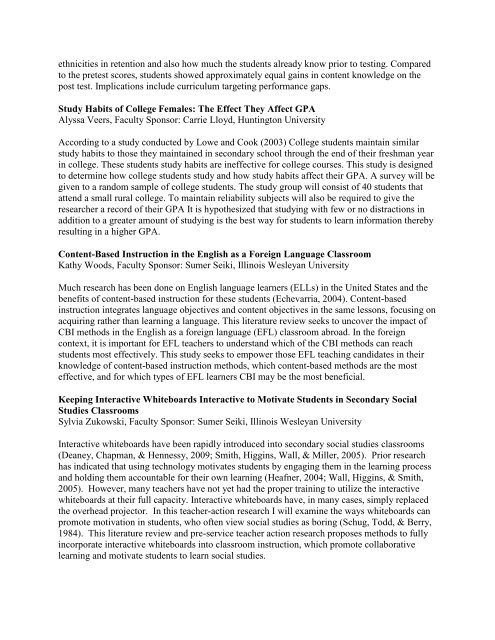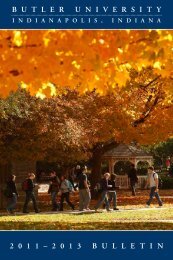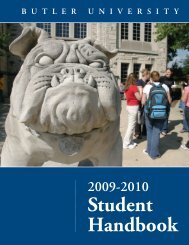Anthropology - Butler University
Anthropology - Butler University
Anthropology - Butler University
Create successful ePaper yourself
Turn your PDF publications into a flip-book with our unique Google optimized e-Paper software.
ethnicities in retention and also how much the students already know prior to testing. Compared<br />
to the pretest scores, students showed approximately equal gains in content knowledge on the<br />
post test. Implications include curriculum targeting performance gaps.<br />
Study Habits of College Females: The Effect They Affect GPA<br />
Alyssa Veers, Faculty Sponsor: Carrie Lloyd, Huntington <strong>University</strong><br />
According to a study conducted by Lowe and Cook (2003) College students maintain similar<br />
study habits to those they maintained in secondary school through the end of their freshman year<br />
in college. These students study habits are ineffective for college courses. This study is designed<br />
to determine how college students study and how study habits affect their GPA. A survey will be<br />
given to a random sample of college students. The study group will consist of 40 students that<br />
attend a small rural college. To maintain reliability subjects will also be required to give the<br />
researcher a record of their GPA It is hypothesized that studying with few or no distractions in<br />
addition to a greater amount of studying is the best way for students to learn information thereby<br />
resulting in a higher GPA.<br />
Content-Based Instruction in the English as a Foreign Language Classroom<br />
Kathy Woods, Faculty Sponsor: Sumer Seiki, Illinois Wesleyan <strong>University</strong><br />
Much research has been done on English language learners (ELLs) in the United States and the<br />
benefits of content-based instruction for these students (Echevarria, 2004). Content-based<br />
instruction integrates language objectives and content objectives in the same lessons, focusing on<br />
acquiring rather than learning a language. This literature review seeks to uncover the impact of<br />
CBI methods in the English as a foreign language (EFL) classroom abroad. In the foreign<br />
context, it is important for EFL teachers to understand which of the CBI methods can reach<br />
students most effectively. This study seeks to empower those EFL teaching candidates in their<br />
knowledge of content-based instruction methods, which content-based methods are the most<br />
effective, and for which types of EFL learners CBI may be the most beneficial.<br />
Keeping Interactive Whiteboards Interactive to Motivate Students in Secondary Social<br />
Studies Classrooms<br />
Sylvia Zukowski, Faculty Sponsor: Sumer Seiki, Illinois Wesleyan <strong>University</strong><br />
Interactive whiteboards have been rapidly introduced into secondary social studies classrooms<br />
(Deaney, Chapman, & Hennessy, 2009; Smith, Higgins, Wall, & Miller, 2005). Prior research<br />
has indicated that using technology motivates students by engaging them in the learning process<br />
and holding them accountable for their own learning (Heafner, 2004; Wall, Higgins, & Smith,<br />
2005). However, many teachers have not yet had the proper training to utilize the interactive<br />
whiteboards at their full capacity. Interactive whiteboards have, in many cases, simply replaced<br />
the overhead projector. In this teacher-action research I will examine the ways whiteboards can<br />
promote motivation in students, who often view social studies as boring (Schug, Todd, & Berry,<br />
1984). This literature review and pre-service teacher action research proposes methods to fully<br />
incorporate interactive whiteboards into classroom instruction, which promote collaborative<br />
learning and motivate students to learn social studies.
















